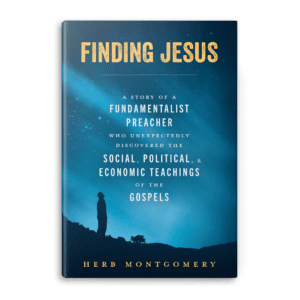
For those who object (I hear these voices loudly in my own head at times), it’s helpful to remember that there is really nothing more to be said if someone who views the Bible, or Christianity, or the Jesus story as an all-or-nothing deal, a book in which the authors never made mistakes or brought in their or their community’s concerns. By taking the Bible as an un-nuanced whole they are setting themselves up to always be destined to exhibit “deeds” that mix life-giving and death-dealing practices. That’s why our own journeys within Christianity are often so complicated. All-or-nothing approaches set us up to try to follow a Christianity that is both extraordinarily beautiful in some regards and a nightmare in others. We must learn to choose between those things that are Christian but death-dealing and those things that are Christian and life-giving. An all-or-nothing approach puts people in a place where they have to grapple with whether they are even Christian at all when nuance would give them a way to embrace the good while rejecting the bad.
Welcome Readers! Please subscribe to Social Jesus Here.
(Read this series from the beginning at Part 1 and Part 2.)
Ultimately, we must instead learn to practice knowing something by its fruit or the deeds it produces. Even our sacred text can be embraced as being inspired by the Divine while having been written by humans. This allows us and it to not always get it right: neither it nor we are infallible. We are simply reaching for and attempting to find ways of answering the big questions that are life-giving. Sometimes we get it right; sometimes we do not. And some questions can’t be answered yet. It’s up to us to hold everything with an open hand, asking questions from our own to-the-best-of-our-knowledge context today. We can let go of things that are death-dealing and hold on to those things that are life-giving. And when we discover that something we thought was life-giving actually isn’t, we can then let go of that, giving way to making room to embrace that which is. We can always be in search of the most life-giving way to follow the life-giving Jesus today, not being threatened by discovering we’ve been wrong about something, and always reaching for what is true.
I feel like that’s enough this week for most of us to chew on, but there are two final things I want to address in our reading.
The exclusivity at the end our reading sounds more like the gospel of John than the Jesus we typically encounter in the synoptics. It may reflect the claims of the early Jesus community and their efforts to communicate Jesus’s importance through the language of exceptionalism.
Today, we can do better. We don’t have to put others down for Jesus and his teachings to be intrinsically valuable. And we don’t have to make Jesus the only source of life-giving things to emphasize the value of his teachings.
Lastly, I want to address the yoke of Jesus being easy and his burden being light. One’s social location matters here. This statement was addressed to those who were worn out from being over-burdened in that society. To them, the yoke of Jesus was much easier than the yoke of the system they were trying survive in. Jesus’ system of resource-sharing, mutual aid, and taking responsibility for ensuring the care and well being of one another was way easier than every person or family being for themselves in a society where every moment they were teetering between survival and catastrophe, living each day one at a time. Again, this statement was given to those whom that system had worn out and overburdened. For them, Jesus’ yoke/burden was easy and light. But for those benefiting from the present system, change would be different. It was “easier for a camel to go through the eye of a needle than for someone who is rich to enter the kingdom of God” (Matthew 19.24) and embrace the changes Jesus’ teachings called them and us to.
Again, there’s a lot in this week’s gospel lectionary reading. What in our reading this week is resonating with you?
Herb’s new book, Finding Jesus: A story of a fundamentalist preacher who unexpectedly discovered the social, political, and economic teachings of the Gospels, is now available at Renewed Heart Ministries.














